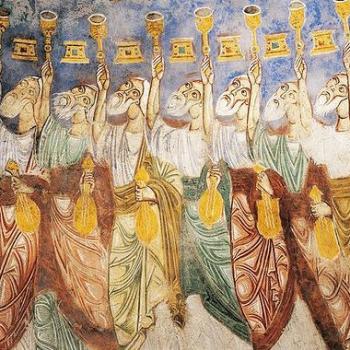Thoughts about Iowa, American Politics, and the Media
I was born a few years ago in the capital city of Iowa–Des Moines. (The two “s-s” are silent, by the way. It’s pronounced “d- moyn.”) My mother was born just east of there in Jasper County. My stepmother was born in whatever county Clarion, Iowa is in. both were born at home on farms. So far as I know my maternal grandparents were all also born in Iowa. My maternal grandfather was born on a farm somewhere near Grinnell. I have relatives all over Iowa–some of them in the ground and some not yet there.
I lived in Iowa twice–the first time from birth until age eleven. Then we moved just across the Iowa-South Dakota border to the what I really consider my “hometown”–Sioux Falls, South Dakota. I moved back to Des Moines to attend college and then moved back to Sioux Falls to attend seminary. My father was born on a farm on the plains of eastern South Dakota–near Brookings where he grew up. I have relatives all over that part of South Dakota–some of them in the ground and some not yet there.
When people ask me where I’m from I say “the Upper Midwest.” If they want me to be more specific I say “Iowa, South Dakota and Minnesota–it’s all one place.” I describe Iowa and South Dakota as “suburbs of Minnesota.”
Iowa is a funny state in many ways. There’s a cultural “line” that runs right through its center–possibly right through Des Moines–east to west, west to east. Below that line the cultural “flavor” is somewhat Southern. Many Southerners moved “up” to Iowa during the depression. As a child my dad’s church was filled with immigrants to Iowa from the Ozarks of Missouri. They came to Des Moines to work in the huge meat packing plants down in the “Bottoms” along the Des Moines river. Our style of worship was deeply marked by their “down home” sentimentality. Southern Gospel music and even Bluegrass was the common genre–especially on Sunday nights.
Above that line the culture is decidedly German and Scandinavian. More reserved and less sentimental and emotional. Below that line it’s common to find grits on the menu at truck stop restaurants. Above that line most people don’t know what grits are!
Iowa is a great place to be born, grow up and leave. That’s what most people born there do–leave. Where do they go? If they are born in the southern half of the state they go to Omaha, Kansas City or St. Louis. If they are born in the northern half of the state they go to Minneapolis-St. Paul. I eventually ended up in the great Upper Midwest “magnet” of “the Twin Cities” which is why I add Minnesota to the places I “come from.”
Every four years the national news media flock from New York and elsewhere to poor old, usually ignored Iowa–“fly over country.” They go there to cover one of the greatest oddities of American politics–the Iowa caucuses. Every four years I get to see my city of birth on national network “prime time” news as the reporters from New York and Chicago scour the city for “human interest stories”–the rather odd looking capital building with it’s gold leaf covered dome, the distinct lack of nightlife (as they think of it) downtown, the striking difference between the inner city and the western suburbs sprawling far out into what used to be corn fields.
I always think to myself (and sometimes say to others) that the media hype about the “Iowa caucuses” is just that–media manufactured hype. The media people who flock to Iowa from New York and Chicago strike me as having nothing but disdain for Iowans. They are, to them, “hicks,” to use an old word. And yet because of the Iowa caucuses–the first “official” test of presidential candidates’ strength “among the people,” they blow it up far out of reasonable proportion. In cynical moments I suspect they (or their bosses back home) see it as an opportunity to rake in ratings. I think the same goes for New Hampshire where they all flock after Iowa.
I recently read a column by a political pundit who argued that the only thing the Iowa caucuses and New Hampshire primary are good for is “weeding out” the inevitable losers. After Iowa and New Hampshire usually only two or three candidates are left on both sides (Republican and Democratic) for the rest of the country to feed on. What I think to myself is: What about New York, California, Texas and Florida–states with numerous delegates to the party conventions? Why should the field of viable candidates be narrowed down for them by Iowa and New Hampshire?
This whole process is such a strange oddity, quirk about American politics that is beyond comprehension even to us–to say nothing of people outside the U.S. watching it.
Whom do I blame for this really irrational approach to selecting the two top contenders for the upcoming presidential election? I blame the mass media. But I also blame ordinary Americans who allow the mass media to do this to all of us. Immediately after the Iowa caucuses the media talking heads (or their writers) begin proclaiming that anyone who came in third or fourth and certainly fifth or sixth has little chance of winning the nomination of his or her party. That’s simply ridiculous–in the sense that it shouldn’t be the case. Iowa Republicans like Ted Cruz. So what?
In my more cynical moments I ask myself whether there’s a financial agenda behind all this hype. Imagine the media moguls thinking about their bottom lines–including especially expenses of covering the campaigns of numerous candidates. Eliminating some strong ones just because they didn’t come in first or second in the Iowa caucuses and/or New Hampshire primaries means they don’t have to spend money covering their campaigns anymore.
I admit it. I’m very cynical about the American media and its motives, intentions and behavior. I have almost given up watching television news. The local channels and increasingly the few national network ones spend much of their time showing clips from Youtube–about strange or charming events that perhaps entertain but don’t really inform viewers about world events. And the female talking heads, at least, are all so beautiful–and mostly young. Are they the only or best qualified journalists to give us the news? Somehow I doubt it.
I descend into crankiness now. But really, people! Why do we allow them to do this to us? I think that if Walter Cronkite were alive today he wouldn’t even get an interview at any of the network news departments.
End of rant.














